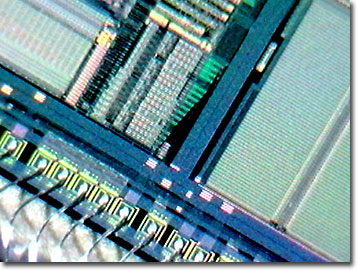Integrated Circuit Image Gallery
Texas Instruments 486SLX Microprocessor
Introduced as an enhanced 486SX chip, Intel and its licensees Texas Instruments, Cyrix, and Advanced Micro Devices produced the 486SLX microprocessor. The Texas Instruments 486SLX was designed for notebook computers such as the IBM Thinkpad, but found seats in the motherboards of other laptops and some desktop computers with 25-MHz and 33-MHz clock speed versions.

View a medium magnification image of the 486SLX processor.
View a high magnification image of the 486SLX processor.
Coupling the pioneering SL technology for managing power, including sleep and other low-power modes, with 0.6-micron manufacturing techniques, Texas Instruments photoetched 1.6 million transistors onto each die, which was capable of operating at only 3.3 volts. These features were very important for the fledgling notepad computer industry because they allowed miniaturization, battery-conservation, and required fewer cooling devices, such as bulky fans and heat sinks, necessary for larger and more power-hungry processors. Some desktop computers outfitted with the 5.0-volt processor, but equipped with the SL power management technology, were awarded "green machine" status by the Environmental Protection Agency.
Although some sources interchange the "SLX" and "SLC" microprocessor designations, the Texas Instruments 486SLX is actually an SL-enhanced SX chip, while the SLC is a newer, more widely marketed design. As a 486SX processor with power-conservation circuitry added, the 486SLX displays similar features to the newer 486SL processors. The 3.3-volt and 5.0-volt versions of the 486SLX were produced with three different package options: the 168-pin Pin-Grid Array (PGA), the 208-pin shrink quad flat pack (SQFP), and the 196-pin plastic quad flat pack (PQFP). Intel followed up the SLX and SLC models of the 486 processor family with ultra-low-power 486SXs.
Contributing Authors
Omar Alvarado, Thomas J. Fellers and Michael W. Davidson - National High Magnetic Field Laboratory, 1800 East Paul Dirac Dr., The Florida State University, Tallahassee, Florida, 32310.
BACK TO THE INTEGRATED CIRCUIT IMAGE GALLERY
BACK TO THE DIGITAL IMAGE GALLERIES
Questions or comments? Send us an email.
© 1995-2025 by Michael W. Davidson and The Florida State University. All Rights Reserved. No images, graphics, software, scripts, or applets may be reproduced or used in any manner without permission from the copyright holders. Use of this website means you agree to all of the Legal Terms and Conditions set forth by the owners.
This website is maintained by our
Graphics & Web Programming Team
in collaboration with Optical Microscopy at the
National High Magnetic Field Laboratory.
Last Modification Friday, Nov 13, 2015 at 01:19 PM
Access Count Since September 17, 2002: 10608
Visit the website of our partner in introductory microscopy education:
|
|
